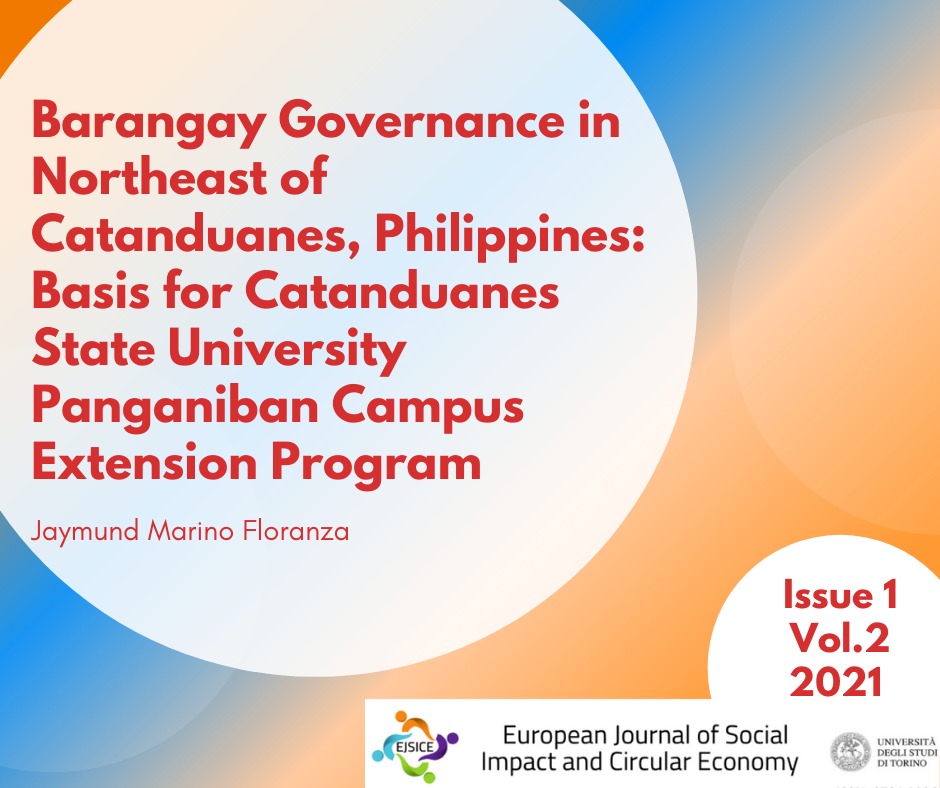Barangay Governance in Northeast of Catanduanes, Philippines: Basis for Catanduanes State University Panganiban Campus Extension Program
DOI:
https://doi.org/10.13135/2704-9906/5058Keywords:
Barangay governance competency, Barangay officials, Local governance, Local government code of 1991Abstract
Governance is an act or a process of governing with power and performing the duties and functions within one's jurisdiction. Barangay governance gives an important role in setting direction to the people in the barangay level. It is an empowerment of the local government units in the country where this present study is interested. This quantitative-qualitative research study intended to look into the Barangay Governance Capabilities among Barangay Captains in Northeast of Catanduanes, Philippines as basis for Catanduanes State University Panganiban Campus Extension Program. The data gathered through the questionnaire and interview guide concluded that the Respondent-Barangay Officials in Northeast of Catanduanes are in the Middle Age, Male, College Level in Educational Attainment, Barangay Council Members and a neophyte in barangay governance having served for three years and below as barangay officials. The indicators of governance revealed that Barangay Captains are more equipped with Barangay Fiscal Administration than in Legislative and Judicial functions. The unstructured interview about the problems regarding the governance capabilities of barangay captains reveals the incompetence of the Barangay Captains, the non-cooperation of the residents or the constituents themselves, and the non-cooperative Barangay Kagawad that genuinely affects the capability of the Barangay Captain. Given the situation, the study recommends that barangay officials, particularly the barangay captains, are enjoined to attend the Barangay Governance Capability training seminar. Intensive monitoring and assessment of their barangay performance should be done regularly. A proposed training package will be carried out where all Catanduanes State University Panganiban Campus Faculty-Extensionists will be involved.
References
Aquino, I. P., Agustin, C. P., & Guadamor, M. L. (2017). Competencies of punong barangay for good governance: An assessment. International Journal of Advanced Research in Management and Social Sciences, 6(5), 102-117.
Boysillo, S. L. (2017) Governance of the Barangay Chairpersons in the Municipality of Ubay Bohol. International Journal of Business and Management Studies, 9(1), 50-63.
Caldo, R. B. (2015). Assessment of Competency Measures of Barangay Council in San Jose, Sto. Tomas, Batangas.
Capuno, J. J. (2005). The quality of local governance and development under decentralization in the Philippines (No. 2005, 06). UPSE Discussion Paper.
de Nichilo, S. (2020). Public Choice in European Affairs: Measuring Election Model.European Journal of Social Impact and Circular Economy,1(1b), 19-37. https://doi.org/10.13135/2704-9906/4608
Flores, R. R. (2019). Assessment of Selected Barangays in Makati City Towards Improved Barangay Governance. In Iapa Proceedings Conference (pp. 141-167).
Gajjar, D. (2013). Ethical consideration in research. Education, 2(7), 8-15.
Labawig, M. C. (2011) Leadership Effectiveness of Barangay Captains: Its Implication to Barangay Development, Unpublished Thesis, Saint Louis University, Baguio City
Layug, A. S., Pantig, I. D. M. T., Bolong, L. E., & Lavado, R. F. (2010). Do barangays really matter in local services delivery?: Some issues and policy options. Philippine Institute for Development Studies.
Medina-Guce, C., Galindes, A. M., Salanga, V., & Sanders, R. (2018). Problematizing the Strengthening of Philippine Democratic Institutions.
Nadeem, M. (2016). Analyzing good governance and decentralization in developing countries. Journal of Political Sciences and Public Affairs, 4(3), 209-220.
Nalbandian, J., O'Neill Jr, R., Michael Wilkes, J., & Kaufman, A. (2013). Contemporary challenges in local government: Evolving roles and responsibilities, structures, and processes. Public Administration Review, 73(4), 567-574.
Noble-Nur, V. (2018). Socio-Demographic Profile and Performance of Women Punong Barangays in Selected Municipalities of Maguindanao. In International Conference on Responsive Education and Socio-Economic Transformation (ICRESET).
Padilla, C. B. T., & Eguia, R. E. (2010). Leadership scale of barangay legislators in Davao City: an application of structural equation model. 11th National Convention on Statistics (NCS), October.
Porio, E. (2012). Decentralisation, power and networked governance practices in Metro Manila. Space and Polity, 16(1), 7-27.
Rubio, J. A. M. A., Pentinio, C. V. P., Ascan, J. C., Mendoza, M. C. D., Vito, J. V., & Encio, H. A. (2016). Involvement in community extension program of business administration students in one higher education institution in the Philippines. Asia Pacific Journal of Multidisciplinary Research, 4(1), 109-122.
Shore, C. (2011). ‘European Governance’ or Governmentality? The European Commission and the Future of Democratic Government. European Law Journal, 17(3), 287-303.
Urmanaviciene, A., & Arachchi, U. (2020). The effective methods and practices for accelerating social entrepreneurship through corporate social responsibility. European Journal of Social Impact and Circular Economy, 1(2), 27-47. https://doi.org/10.13135/2704-9906/5085
ur Rehman, U., Shafiq, M., Ali, H., & Abdullah, M. (2020). Green and sustainable construction practices impact on Organizational Development. European Journal of Social Impact and Circular Economy, 1(2), 1-26. https://doi.org/10.13135/2704-9906/5068
Viray, J. R. Followership Modalities and Big Five Factor Personality Dimensions of Local (Barangay) Government Officials of Sta. Mesa, Manila.
Yilmaz, S., & Venugopal, V. (2013). Local government discretion and accountability in Philippines. Journal of International Development, 25(2), 227-250
Yoders, S. (2014). Constructivism Theory and Use from 21 st Century Perspective. Journal of Applied Learning Technology, 4(3).
Zeynalli, L. (2020). The impact of stimulating the development of Human Capital on Economic Development. European Journal of Social Impact and Circular Economy, 1(1b), 38-52. https://doi.org/10.13135/2704-9906/4562


 EJSICE has been approved for inclusion in DOAJ. The DOAJ listing of the journal is available at
EJSICE has been approved for inclusion in DOAJ. The DOAJ listing of the journal is available at  EJSICE is a member of
EJSICE is a member of  EJSICE is indexed by
EJSICE is indexed by  EJSICE is listed in the ANVUR (Italian National Agency for the Evaluation of Universities and Research Institutes) as a scientific journal in AREA 13 - Economic and Statistical Sciences and AREA 14 - Political and Social Sciences.
EJSICE is listed in the ANVUR (Italian National Agency for the Evaluation of Universities and Research Institutes) as a scientific journal in AREA 13 - Economic and Statistical Sciences and AREA 14 - Political and Social Sciences. 

